人教版九年级英语unit4语法知识点
人教版九年级英语Unit4知识点梳理及语法讲义(教师版)

—What’s he like?他是什么样的人?
—He’s outgoing.他是外向的。
【拓展延伸】
(1)“What does sb. look like?”意为“某人长什么样?”,只能用来提问人的外貌,不能用来提问人的性格、品质等。其中like是介词,意为“像”。
13. examination(n.考试) —examine(v.考试;审查)
14. exactly(adv.确切地)—exact(adj.精确的)
15. pride(n.骄傲;自豪)—proud(adj.自豪的;骄傲的)
16. general(adj.总的;普遍的)—generally(adv.通常地)
【注意】陈述句和附加问句在人称、数和时态上必须保持一致,
且附加问句的主语必须为代词。
【拓展延伸】反意疑问句的答语
(1)反意疑问句的答语应符合事实。事实是肯定的用yes,事实是否定的用no
(2) 当句式是“前否后肯”的结构时,翻译要以事实为依据,yes翻译为“不是”,no翻译为“是的”
►—Sheisa student,isn’tshe?她是一个学生,不是吗?
3. help(n/v.帮助) —helpful(adj.有帮助的)—helpless(adj.没有帮助的)
4. interview(v.采访;面试) —interviewer(n.采访者)
5. Asia(n.亚洲)—Asian()
6. deal(v.对付;对待) —dealt(过去式/过去分词)
7. shy(adj.害羞的) —shyness(n.害羞;腼腆)
【用法详解】
(1)
(2)19yearold意为“19岁的”(重点)
人教版九年级全一册英语Unit4单元语法知识点总结
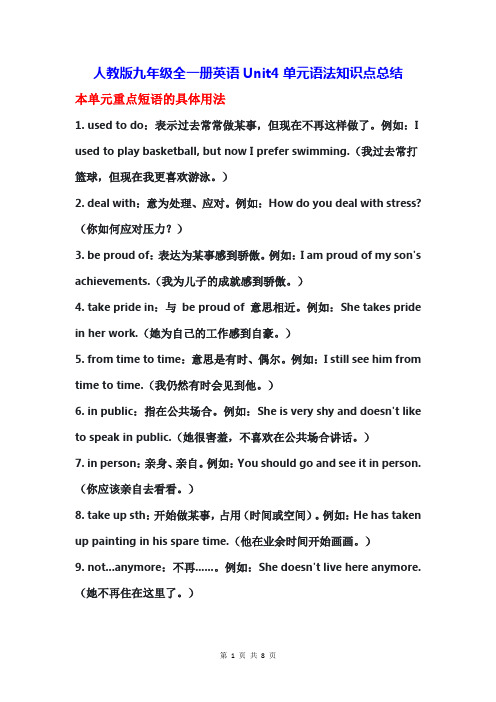
人教版九年级全一册英语Unit4单元语法知识点总结本单元重点短语的具体用法1. used to do:表示过去常常做某事,但现在不再这样做了。
例如:I used to play basketball, but now I prefer swimming.(我过去常打篮球,但现在我更喜欢游泳。
)2. deal with:意为处理、应对。
例如:How do you deal with stress?(你如何应对压力?)3. be proud of:表达为某事感到骄傲。
例如:I am proud of my son's achievements.(我为儿子的成就感到骄傲。
)4. take pride in:与be proud of 意思相近。
例如:She takes pride in her work.(她为自己的工作感到自豪。
)5. from time to time:意思是有时、偶尔。
例如:I still see him from time to time.(我仍然有时会见到他。
)6. in public:指在公共场合。
例如:She is very shy and doesn't like to speak in public.(她很害羞,不喜欢在公共场合讲话。
)7. in person:亲身、亲自。
例如:You should go and see it in person.(你应该亲自去看看。
)8. take up sth:开始做某事,占用(时间或空间)。
例如:He has taken up painting in his spare time.(他在业余时间开始画画。
)9. not...anymore:不再......。
例如:She doesn't live here anymore.(她不再住在这里了。
)10. worry about:担心、担忧。
例如:Don't worry about the exam, just do your best.(不要担心考试,尽力就好。
人教版九年级英语unit4知识点

九年级unit4知识点1.humor n. 幽默humorous adj. 有幽默感的,有趣儿的2. silent adj. 不说话的,沉默的keep silent,保持沉默silence n. 沉默,无声in silence 沉默,无声3. helpful adj. 有用的,有帮助的be helpful to sb 对某人有帮助eg: The book is helpful to the students.4. from time to time 时常, 有时= sometimes = at times5. Asian adj. 亚洲的, 亚洲人的, 亚洲人Asia n. 亚洲6. deal with = do with (deal with用how提问,do with 用what提问)7. shy adj. 害羞的shyness n. 害羞,腼腆8. dare to do sth 敢于做某事eg: We must dare to think speak and act.9. crowd n. 人群, 观众crowded adj. 拥挤的uncrowded adj. 不拥挤的, 人少的10. tons of 许多的,大量的= lots of= a lot of= a number ofeg: She gets tons of male every day.11. private adj. 私人的, 秘密的= personal12. require sb to do sth 要求某人做某事eg: The teacher required the students to be quiet.13. Europe n. 欧洲European adj. 欧州的,欧洲人的, 欧洲人14. Africa n. 非洲African adj. 非洲的, 非洲人的, 非洲人15. give a speech 演说, 演讲eg: They invited him to give a speech.16. in public 公开地eg: It's impolite to speak loudly in public.17. influence v. influnce sb to do sth 影响某人使其做某事influence n. 影响have an influence on sb 对人有影响eg: His idea had a great influence on me.18. be absent from 缺席eg: They were absent from work that day.absent adj. absence n.19. fail to do 未能做某事eg: I failed to pass the driving test.20. in person 亲身, 亲自21. be proud of = take pride in 为...自豪, 感到骄傲。
人教版九年级英语unit4知识点总结

Unit41.过去常常做。
used to do sth 其否定和疑问借助助动词did)习惯做某事be/get used to doing sth2.It’s / has been +时间段+since+一般过去时态句子“自从。
已经有多长时间了。
”It’s / It has been three years since we last saw her.3.from time to time 时不时地;有时(=sometimes)4.not…+形/副+enough+ to do sth 不够。
不能做。
She was never brave enough to ask questions.5.get good grades in .. 在。
(方面)取得好成绩6.(be) on a swim team 加入游泳队7.be (more) interested in…. 对。
(更)感兴趣8.I used to be afraid of the dark.我过去害怕黑暗。
9. be alone 独处;alone (副词)单独;独自•feel lonely 感到孤独lonely(形容词)孤独的10. give a speech in public 在公共场所演讲11. on 关于12.at least +数词至少13.worry about…= be worried about …担心14. all the time一直;始终15.be/feel nervous about “对……感到紧张”16.such+(a/an)+形容词+名词(一个)如此。
的。
such a beautiful girl 一个如此漂亮的女孩so+形/副so many flowers, so much water.17.see sb. doing sth 看见某人正在做某事18.Score可数名词:得分,进球get good scores in / on…动词:得分,进球19. turn red / yellow20. an ant / an insect / a European country21.19岁的19-year-old 数词-单数名词“。
人教版九年级英语上册Unit 4短语、句型及语法
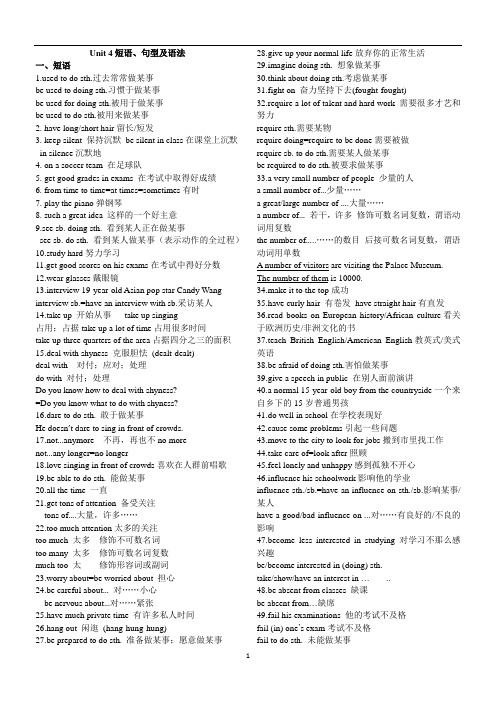
Unit 4短语、句型及语法一、短语ed to do sth.过去常常做某事be used to doing sth.习惯于做某事be used for doing sth.被用于做某事be used to do sth.被用来做某事2. have long/short hair留长/短发3. keep silent 保持沉默be silent in class在课堂上沉默in silence沉默地4. on a soccer team 在足球队5. get good grades in exams 在考试中取得好成绩6. from time to time=at times=sometimes有时7. play the piano弹钢琴8. such a great idea 这样的一个好主意9.see sb. doing sth. 看到某人正在做某事see sb. do sth. 看到某人做某事(表示动作的全过程)10.study hard努力学习11.get good scores on his exams在考试中得好分数12.wear glasses戴眼镜13.interview 19-year-old Asian pop star Candy Wang interview sb.=have an interview with sb.采访某人14.take up 开始从事take up singing占用;占据take up a lot of time占用很多时间take up three quarters of the area占据四分之三的面积15.deal with shyness 克服胆怯(dealt-dealt)deal with 对付;应对;处理do with 对付;处理Do you know how to deal with shyness?=Do you know what to do with shyness?16.dare to do sth. 敢于做某事He doesn’t dare to sing in front of crowds.17.not…anymore 不再,再也不no morenot…any longer=no longer18.love singing in front of crowds喜欢在人群前唱歌19.be able to do sth. 能做某事20.all the time 一直21.get tons of attention 备受关注tons of….大量,许多……22.too much attention太多的关注too much 太多修饰不可数名词too many 太多修饰可数名词复数much too 太修饰形容词或副词23.worry about=be worried about 担心24.be careful about…对……小心be nervous about…对……紧张25.have much private time 有许多私人时间26.hang out 闲逛(hang-hung-hung)27.be prepared to do sth. 准备做某事;愿意做某事28.give up your normal life放弃你的正常生活29.imagine doing sth. 想象做某事30.think about doing sth.考虑做某事31.fight on 奋力坚持下去(fought-fought)32.require a lot of talent and hard work 需要很多才艺和努力require sth.需要某物require doing=require to be done需要被做require sb. to do sth.需要某人做某事be required to do sth.被要求做某事33.a very small number of people 少量的人a small number of…少量……a great/large number of ….大量……a number of…若干,许多修饰可数名词复数,谓语动词用复数the number of…..……的数目后接可数名词复数,谓语动词用单数A number of visitors are visiting the Palace Museum.The number of them is 10000.34.make it to the top成功35.have curly hair 有卷发have straight hair有直发36.read books on European history/African culture看关于欧洲历史/非洲文化的书37.teach British English/American English教英式/美式英语38.be afraid of doing sth.害怕做某事39.give a speech in public 在别人面前演讲40.a normal 15-year-old boy from the countryside一个来自乡下的15岁普通男孩41.do well in school在学校表现好42.cause some problems引起一些问题43.move to the city to look for jobs搬到市里找工作44.take care of=look after照顾45.feel lonely and unhappy感到孤独不开心46.influence his schoolwork影响他的学业influence sth./sb.=have an influence on sth./sb.影响某事/某人have a good/bad influence on ...对……有良好的/不良的影响47.become less interested in studying 对学习不那么感兴趣be/become interested in (doing) sth.take/show/have an interest in …..48.be absent from classes 缺课be absent from…缺席49.fail his examinations 他的考试不及格fail (in) one’s exam考试不及格fail to do sth. 未能做某事150.make the/a decision to do sth. 决定做某事=decide to do sth.=make up one’s mind to do sth.make one’s own decision自己做决定make important decisions做重要的决定51.send him to a boarding school 送他到寄宿学校52.make friends 交朋友make friends with sb.与某人交朋友be friends with sb.成为某人的朋友53.find life there difficult发觉那儿的生活艰难54.advise sb. to do sth.建议某人做某事55.in person亲自56.take a 24-hour train and a 5-hour bus ride to get to Li Wen’s school 乘坐24小时的火车,5小时的汽车到李文的学校57.even though/if 即使58.take pride in 以……为自豪59.have much more communication with sb.与某人有更多的交流60.become more outgoing变得更外向61.join the school basketball team加入校篮球队62.become active in many other activities在许多其它的活动上变得更积极63.be proud of 以……为自豪=take pride in64.have a long talk进行长谈65.remain silent保持沉默keep silent66.most of the time大多数时间67.help his students win the English competition 帮助他的学生赢得英语竞赛help sb. (to) do sth./help sb. with sth.68.have a great influence on sb. 对某人影响大69.tell us interesting jokes 给我们讲有趣的笑话70.give a general self-introduction in a job interview在面试中作简要的自我介绍71.play well in the basketball game在篮球比赛中打得好72.in the last few years在过去的几年中/ in the past twenty years 在过去的20年Great changes have taken place in the past twenty years. My hometown has changed a lot in the past twenty years.二、句型1.I used to be afraid of the dark.我过去害怕黑暗。
初中英语 人教版 九年级全一册 Unit 4 知识点
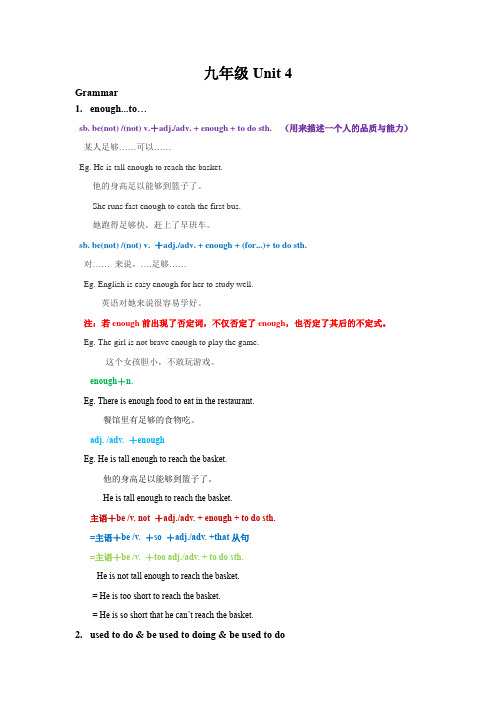
九年级Unit 4Grammar1.enough...to…sb. be(not) /(not) v.+adj./adv. + enough + to do sth. (用来描述一个人的品质与能力)某人足够……可以……Eg. He is tall enough to reach the basket.他的身高足以能够到篮子了。
She runs fast enough to catch the first bus.她跑得足够快,赶上了早班车。
sb. be(not) /(not) v. +adj./adv. + enough + (for...)+ to do sth.对…… 来说,….足够……Eg. English is easy enough for her to study well.英语对她来说很容易学好。
注:若enough前出现了否定词,不仅否定了enough,也否定了其后的不定式。
Eg. The girl is not brave enough to play the game.这个女孩胆小,不敢玩游戏。
enough+n.Eg. There is enough food to eat in the restaurant.餐馆里有足够的食物吃。
adj. /adv. +enoughEg. He is tall enough to reach the basket.他的身高足以能够到篮子了。
He is tall enough to reach the basket.主语+be /v. not +adj./adv.+ enough+ to do sth.=主语+be /v. +so +adj./adv.+that从句=主语+be /v. +too adj./adv.+ to do sth.He is not tall enough to reach the basket.= He is too short to reach the basket.= He is so short that he can’t reach the basket.ed to do & be used to doing & be used to doused to do sth. 过去常常做某事(现在不做了)主语适用于各种人称。
人教版九年级上册英语 Unit 4 词汇与语法基础(解析版)

知识图谱Unit 4 I used to be afraid of the dark.知识精讲一、必背词汇humorous adj. 有幽默感的;滑稽有趣的silent adj. 不说话的;沉默的helpful adj. 有用的;有帮助的score n. & v. 得分;打分background n. 背景interview v. 采访;面试n. 面试;访谈Asian adj. 亚洲的;亚洲人的n. 亚洲人dare v. 敢于;胆敢private adj. 私人的;私密的guard n. 警卫;看守v. 守卫;保卫require v. 需要;要求European adj. 欧洲的;欧洲人的British adj. 英国的;英国人的speech n. 讲话;发言ant n. 蚂蚁insect n. 昆虫influence v. & n. 影响seldom adv. 不常;很少proud adj. 自豪的;骄傲的absent adj. 缺席;不在fail v. 失败;未能(做到)examination n. 考试;审查leaf n 树叶exactly adv. 确切地;精确地pride n. 自豪;骄傲grandson n. 孙子;外孙general adj. 普遍的;常规的;总的n. 将军introduction n. 介绍二、重点词汇1. humorous adj.funny, or making you laugh幽默的;滑稽的例句:Her latest book is a humorous look at teenage life.她的新书是对青少年生活的一种幽默审视。
2. interview v.1). a meeting in which someone asks you questions to see if you are suitable for a job or course面试;面谈例句:I had an interview for a job with a publisher.我参加了一家出版公司的求职面试。
Unit4(单元知识清单)SectionA(基础知识点语法)九年级英语全一册(人教版)
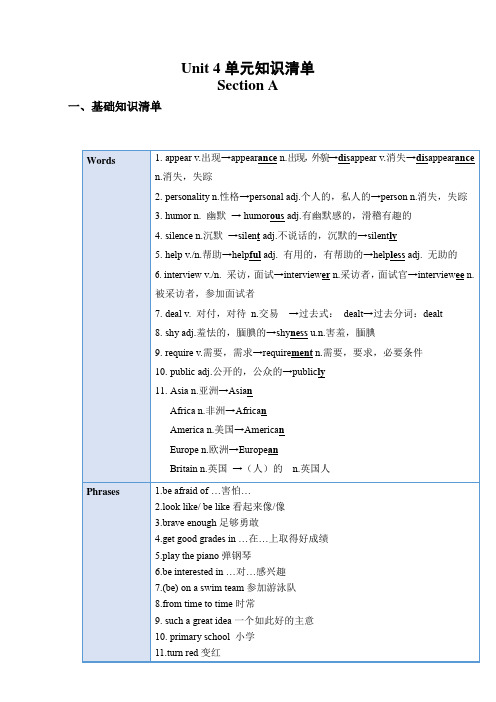
Unit 4单元知识清单Section A一、基础知识清单二、知识点清单1. What's he like now? 他现在什么样子?be like和look likebe like:“像……一样”,常指品德、相貌等相像更侧重人的个性特征。
look like:“看起来像……”,常指外貌上相像。
e.g.What does your sister look like?你姐姐长什么样子?She has long black hair.What's your sister like?你姐姐怎么样?/你姐姐是怎样一个人?She is kind.她很善良。
2. Mario, you used to be short, didn't you?马里奥,你过去很矮,对吗?反义疑问句的特点是“前否后肯”或“前肯后否”,而且后半句在时态、人称、数等方面必须与前半句保持一致。
回答反义疑问句和回答其他一般疑问句的结构一样,如果答语是肯定的,用“Yes +肯定结构”。
如果答语是否定的,用“No +肯定结构”。
回答陈述部分为否定句的反义疑问句时,Yes或是No的汉语意思与它们本身的词义相反。
e.g. They work hard,don't they?他们努力工作,不是吗?Yes, they do.对,他们工作努力。
/No, they don't.不,他们工作不努力They don't work hard, do they? 他们不太努力工作,是吗?Yes, they do. 不,他们工作努力。
/No, they don't. 是的,他们工作不努力3. He used to wear glasses.used to do sth. 过去常常做某事be used to doing sth. 习惯于做某事e.g. Mario used to have short curly hair.They are used to walking to school.This knife is used to cut fruit./ This knife is used for cutting fruit.4. It's been three years since we last saw our primary school classmates.It has been +一段时间+since 从句/过去时间点(since引导的从句用一般过去时,主句用现在完成时)e.g.We have been friends since three years ago.5. She used to be really shy and took up singing ...take up sth/ doing sth 从事、开始培养(兴趣爱好);占据(空间);占用(时间)e.g. Linda took up a new hobby last year.They will take up playing basketball next month.6. She took up singing to deal with her shyness.1.deal with/ do with sth 处理某事而do with与what连用,deal with则与how搭配使用,如:I don't know what to do with the car.He doesn't know how to deal with this matter.2.shy 的比较级shyer, 名词形式shyness7. She dared to sing in front of her class.dare (not) to do sth. (不)敢于做某事dare用作实义动词,此时其后的动词不定式可带to也可不带to,且dare有人称和数以及时态的变化。
人教版英语九年级上册Unit4知识点梳理及语法讲解
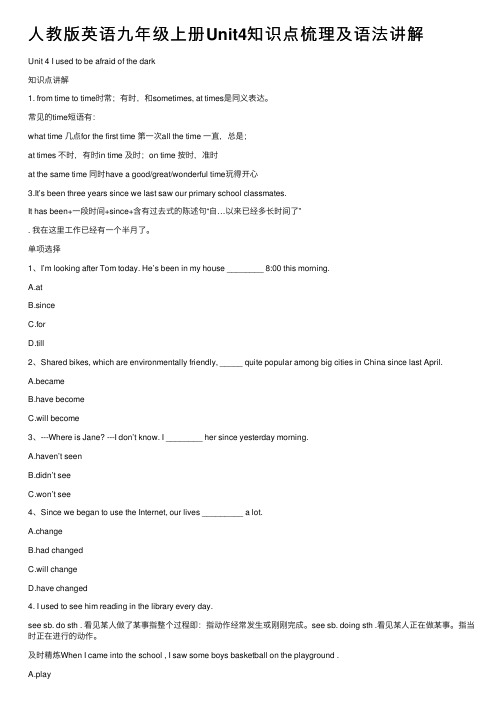
⼈教版英语九年级上册Unit4知识点梳理及语法讲解Unit 4 I used to be afraid of the dark知识点讲解1. from time to time时常;有时,和sometimes, at times是同义表达。
常见的time短语有:what time ⼏点for the first time 第⼀次all the time ⼀直,总是;at times 不时,有时in time 及时;on time 按时,准时at the same time 同时have a good/great/wonderful time玩得开⼼3.It’s been three years since we last saw our primary school classmates.It has been+⼀段时间+since+含有过去式的陈述句“⾃…以来已经多长时间了”. 我在这⾥⼯作已经有⼀个半⽉了。
单项选择1、I’m looking after Tom today. He’s been in my house ________ 8:00 this morning.A.atB.sinceC.forD.till2、Shared bikes, which are environmentally friendly, _____ quite popular among big cities in China since last April.A.becameB.have becomeC.will become3、---Where is Jane? ---I don’t know. I ________ her since yesterday morning.A.haven’t seenB.didn’t seeC.won’t see4、Since we began to use the Internet, our lives _________ a lot.A.changeB.had changedC.will changeD.have changed4. I used to see him reading in the library every day.see sb. do sth . 看见某⼈做了某事指整个过程即:指动作经常发⽣或刚刚完成。
Unit4知识语法点2023-2024学年人教版九年级英语全册

unit 4 I used to be afraid of the dark1.I used to be afraid of the dark.我过去查查怕黑used to 意为“曾经,过去常常”表示过去一度存在或经常发生,但现在已经不存在的动作或状态。
其后接动词原形,且不与表示过去的时间状语连用。
其否定形式为didn’t use to或used not toI used to live with my parents.我以前和父母住在一起(现在不住一起)He didn’(说明现在是戴眼镜的)2形容词silent 意为“沉默的”常用短语:be/keep silent 保持沉默其名词为silence 沉默,寂静;常用短语:in silence 沉默,寂静The classroom was in silence when the teacher came in.当老师进来时,教室是安静的.3.This party is such a great idea!这次聚会真是个好想法!形容词such,表示“这样的,如此的”,such是用来修饰名词的,因此such的常见结构是:1) such+a(an)+adj.+单数可数名词+thatHe is such a clever boy that everybody likes him. 他非常聪明,大家都非常喜欢他。
He was such an honest man that he was praised by the teacher.他因非常诚实而受到了老师的表扬。
2)such+adj.+复数可数名词+thatThey are such interesting novels that I want to read them once again.这些小说非常有趣,我想再读一遍。
3)such+adj.+不可数名词+thatHe has made such great progress that the teachers are pleased with him.他进步得很快,老师们对他感到很满意。
人教版英语九年级Unit4单元知识点归纳
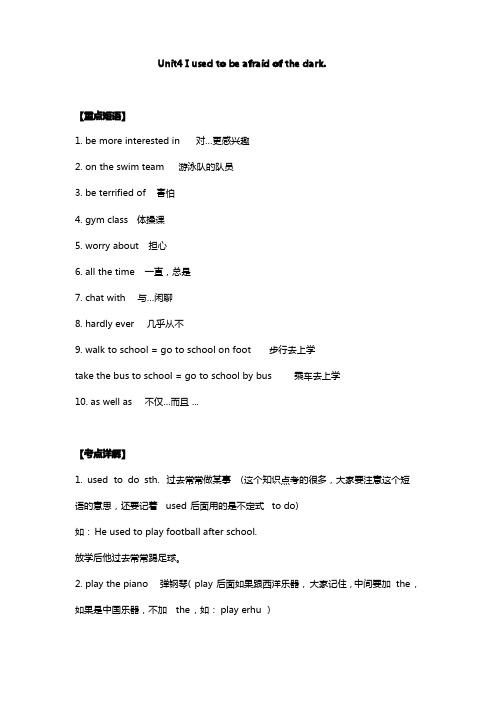
Unit4 I used to be afraid of the dark.【重点短语】1. be more interested in对…更感兴趣2. on the swim team游泳队的队员3. be terrified of害怕4. gym class体操课5. worry about担心6. all the time一直,总是7. chat with与…闲聊8. hardly ever几乎从不9. walk to school = go to school on foot步行去上学take the bus to school = go to school by bus乘车去上学10. as well as不仅…而且...【考点详解】ed to do sth.过去常常做某事(这个知识点考的很多,大家要注意这个短语的意思,还要记着used后面用的是不定式to do)如:He used to play football after school.放学后他过去常常踢足球。
2. play the piano弹钢琴(play后面如果跟西洋乐器,大家记住,中间要加the,如果是中国乐器,不加the,如:play erhu)3.①be interested in sth.对…感兴趣②be interested in doing sth.对做…感兴趣(对于这两个用法大家一定要掌握,切记切记)如:He is interested in math, but he isn't interested in speaking English.他对数学感兴趣,但是他对说英语不感兴趣。
4. interested adj.感兴趣的,指人对某事物感兴趣,往往主语是人interesting adj.有趣的,指某事物/某人具有趣味,主语往往是物(对于interested 和interesting要区分清楚,一个主语往往是人,一个主语往往是物)5. be terrified of sth.害怕……如:I am terrified of the dog.be terrified of doing sth.害怕做……如:I am terrified of speaking.6. spend动词,表示“花费金钱、时间”(spend和pay for它们的主语都是人,这一点大家要清楚)①spend…on sth.在某事上花费(金钱、时间)(重要考点)②spend…(in)doing sth.花费(金钱、时间)去做某事(重要考点,尤其要注意动名词,也就是动词的ing形式)如:He spends too much time on clothes.他花费太多的时间在衣着上。
人教版丨九年级英语4单元必记知识点

人教版丨九年级英语4单元必记知识点Unit4 I used to be afraid of the dark.【重点短语】1. be more interested in 对…更感兴趣2. on the swim team 游泳队的队员3. be terrified of 害怕4. gym class 体操课5. worry about 担心6. all the time 一直,总是7. chat with 与…闲聊8. hardly ever 几乎从不9. walk to school = go to school on foot 步行去上学take the bus to school = go to school by bus 乘车去上学10. as well as 不仅…而且...【考点详解】1. used to do sth. 过去常常做某事(这个知识点考的很多,大家要注意这个短语的意思,还要记着used后面用的是不定式to do)如:He used to play football after school.放学后他过去常常踢足球。
2. play the piano 弹钢琴(play后面如果跟西洋乐器,大家记住,中间要加the,如果是中国乐器,不加the,如:play erhu)3. ①be interested in sth. 对…感兴趣②be interested in doing sth. 对做…感兴趣(对于这两个用法大家一定要掌握,切记切记)如:He is interested in math, but he isn't interested in speaking English. 他对数学感兴趣,但是他对说英语不感兴趣。
4. interested adj. 感兴趣的,指人对某事物感兴趣,往往主语是人interesting adj.有趣的,指某事物/某人具有趣味,主语往往是物(对于interested和interesting要区分清楚,一个主语往往是人,一个主语往往是物)5. be terrified of sth. 害怕……如:I am terrified of the dog.be terrified of doing sth. 害怕做……如:I am terrified of speaking.6. spend 动词,表示“花费金钱、时间”(spend和pay for它们的主语都是人,这一点大家要清楚)①spend…on sth. 在某事上花费(金钱、时间)(重要考点)②spend…(in)doing sth. 花费(金钱、时间)去做某事(重要考点,尤其要注意动名词,也就是动词的ing形式)如:He spends too much time on clothes. 他花费太多的时间在衣着上。
人教版九年级英语UNIT4知识点语法点总结what would you do(附虚拟语气)
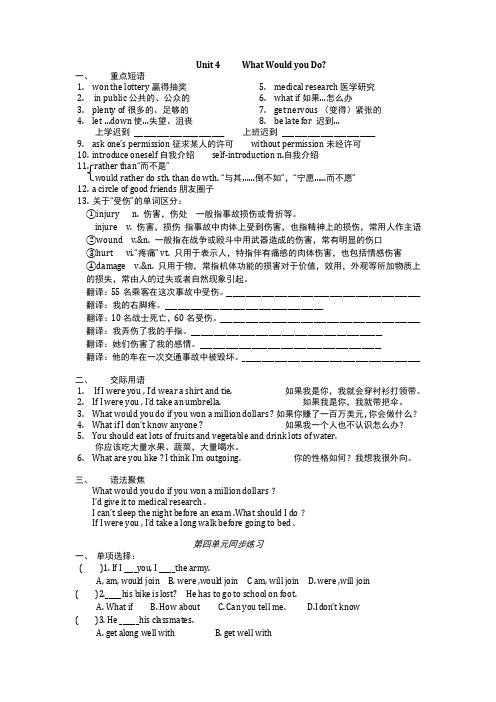
Unit 4 What Would you Do?一、重点短语1.won the lottery 赢得抽奖2. in public 公共的、公众的3.plenty of 很多的、足够的4.let …down使…失望、沮丧5.medical research 医学研究6.what if 如果…怎么办7.get nervous (变得)紧张的8.be late for 迟到…上学迟到____________________________ 上班迟到_____________________________9.ask one’s permission 征求某人的许可without permission 未经许可10.introduce oneself 自我介绍self-introduction n.自我介绍11. rather than“而不是”would rather do sth. than do wth. “与其……倒不如”,“宁愿…...而不愿”12.a circle of good friends 朋友圈子13.关于“受伤”的单词区分:①injury n. 伤害,伤处一般指事故损伤或骨折等。
injure v. 伤害,损伤指事故中肉体上受到伤害,也指精神上的损伤,常用人作主语②wound v.&n. 一般指在战争或殴斗中用武器造成的伤害,常有明显的伤口③hurt vi.“疼痛” vt. 只用于表示人,特指伴有痛感的肉体伤害,也包括情感伤害④damage v.&n. 只用于物,常指机体功能的损害对于价值,效用,外观等所加物质上的损失,常由人的过失或者自然现象引起。
翻译:55名乘客在这次事故中受伤。
____________________________________________________________ 翻译:我的右脚疼。
_________________________________________________翻译:10名战士死亡,60名受伤。
Unit4语法人教版英语九年级全册

Unit 4 一、课本词组1 from time to time 时常,有时2 on time 按时3 in time 及时4 at the same time 同时5 in no time 立即6 at times = sometimes 有时7 at a time 一次8 all the time一直,总是9 boarding school 寄宿学校10 for the first time 第一次11 in person 亲自,亲身12 deal with 应对,处理13 in public 公开地;在别人(尤指生人)面前14 take pride in 为…感到自豪15 be proud of 为…感到自豪16 straight hair直发/ short hair短发/ curly hair卷发17 look like看起来像18 wear glasses戴眼镜19 in class在课堂上20 get good grade/scores on one’s exam某人考试中取得好成绩get good grade/scores in+科目某科目取得好成绩21 play the piano弹钢琴22 be interested in对…感兴趣23 play soccer/football踢足球24 on a swimming team在游泳队中(be on a…team在…队中,是…的队员)25 talk to sb.对…说话26 look at看着27 look for jobs找工作28 pop star流行乐明星29 pop music流行乐30 country music乡村音乐3132 in front of crowds在众人面前33 in the front of在…前面34 not…anymore /not any longer不再…35 be famous for=be known for因…而出名3637 get tons of attention万众瞩目38 worry about = be worried about担心39 be careful about小心,当心40 private time私人时间41 hang out出去玩4243 give up放弃44 normal life正常生活45 think about考虑46 fight on继续战斗47 a very small number of people极少数人48 European history欧洲历史49 African culture亚洲文化50 British English英式英语51 American English美式英语52 watch scary movies看恐怖片53 give a speech in public进行公共演讲54 P.E. class体育课55 on a soccer team在足球队中56 in the past在过去57 be nervous about tests担心考试58 from the countryside来自农村59 work hard努力学习/努力工作60 do well in = be good at 擅长61 have difficulties in doing sth.在…方面有困难62 a few years ago几年前63 move to the city移居城市64 take care of 照顾65 be less interested in对…降低兴趣66 be absent from classes缺课67 fail one’s examinations考试失败6869 make friends交朋友70 71 take a 24hour train and a 5hour bus ride坐了24小时火车和5小时汽车72 have a long talk进行了漫长的谈话73 even though=even if即使(引导让步状语从句)7475 after that从那以后76 have much more munication with sb.和…有更多沟通77 be active in在…方面很积极78 general introduction总体介绍79 in the last/past few years在过去的几年中80 be silent in class在课堂上保持沉默81 make it to the top到达成功的顶峰82 the road to success通往成功之路8385 the whole school整个学校86 turn red变红二、语法精讲1.used to do sth.表示“过去常常做某事”,只表示过去和现在对比,暗示现在不做了。
- 1、下载文档前请自行甄别文档内容的完整性,平台不提供额外的编辑、内容补充、找答案等附加服务。
- 2、"仅部分预览"的文档,不可在线预览部分如存在完整性等问题,可反馈申请退款(可完整预览的文档不适用该条件!)。
- 3、如文档侵犯您的权益,请联系客服反馈,我们会尽快为您处理(人工客服工作时间:9:00-18:30)。
人教版九年级英语unit4语法知识点人教版九年级英语Unit 4语法知识点
在英语学习中,语法是非常重要的一部分。
掌握语法知识可以帮助我们正确理解和运用英语。
本文将介绍人教版九年级英语Unit 4的语法知识点,帮助大家更好地学习和应用。
一、现在完成时
现在完成时用来表示过去发生的动作对现在的影响或结果。
它的结构是主语 + have/has + 过去分词。
例句:
1. I have finished my homework.(我已经完成作业。
)
2. He has gone to the supermarket.(他已经去超市了。
)
我们可以使用现在完成时来描述过去发生的事情对当前状态的影响。
比如 "I have lost my key."(我丢了我的钥匙)表示我现在没有钥匙。
二、情态动词
情态动词用来表示说话者对某个动作或状态的态度、可能性、允许性等。
常见的情态动词有 can, could, may, might(可以)、must(必须)、shall, should(应该)、will, would, need等。
例句:
1. You can go to the party.(你可以去参加派对。
)
2. He must finish his homework before playing games.(他必须先做完作业再玩游戏。
)
情态动词有一些特点:后面接动词原形,表示客观的态度或可能性;情态动词本身没有人称和数的变化;句子中情态动词和动词基本形的变化最小。
三、虚拟语气
虚拟语气用来表示非真实或假设的情况。
在条件从句中,用虚拟语气来表示可能不会实现的愿望、假设或建议等。
常见的虚拟语气形式有:would/could/might +动词原形。
例句:
1. If I were a bird, I would fly in the sky.(如果我是一只鸟,我会在天空飞翔。
)
2. I wish I could go with you.(我希望我能和你一起去。
)
四、比较级和最高级
比较级用来比较两个或多个人或事物的差异或程度。
形容词的比较级和最高级通常是在词尾加 er/est或在前面加more/most。
例句:
1. She is taller than her sister.(她比她妹妹高。
)
2. This book is more interesting than that one.(这本书比那本书
更有趣。
)
在比较级中,有一些不规则变化的词需要记忆,如 good - better - best(好 - 更好 - 最好), bad - worse - worst(坏 - 更坏 - 最坏)。
五、定语从句
定语从句用来修饰一个名词,并进一步说明该名词的具体内容。
它通常由关系代词 who, whom, whose, which或关系副词 when, where, why等引导。
例句:
1. The girl who is reading a book is my sister.(正在看书的那个女孩是我妹妹。
)
2. This is the reason why he is late.(这就是他迟到的原因。
)
在定语从句中,关系代词可作主语、宾语或定语。
关系副词在
从句中充当状语。
六、被动语态
被动语态用于强调动作的承受者而不是执行者。
被动语态的一
般形式是:be + 过去分词。
例句:
1. The letter was written by Mary.(信是玛丽写的。
)
2. The window has been broken.(窗户被打破了。
)
在被动语态中,强调动作的承受者而省略执行者。
被动语态可以用于各种时态和语态之中。
以上是人教版九年级英语Unit 4的语法知识点的简要介绍。
希望这些内容能够帮助大家更好地理解和运用英语语法。
通过不断的练习和实践,我们可以更加流利地表达自己的思想和观点。
祝大家学习进步!。
